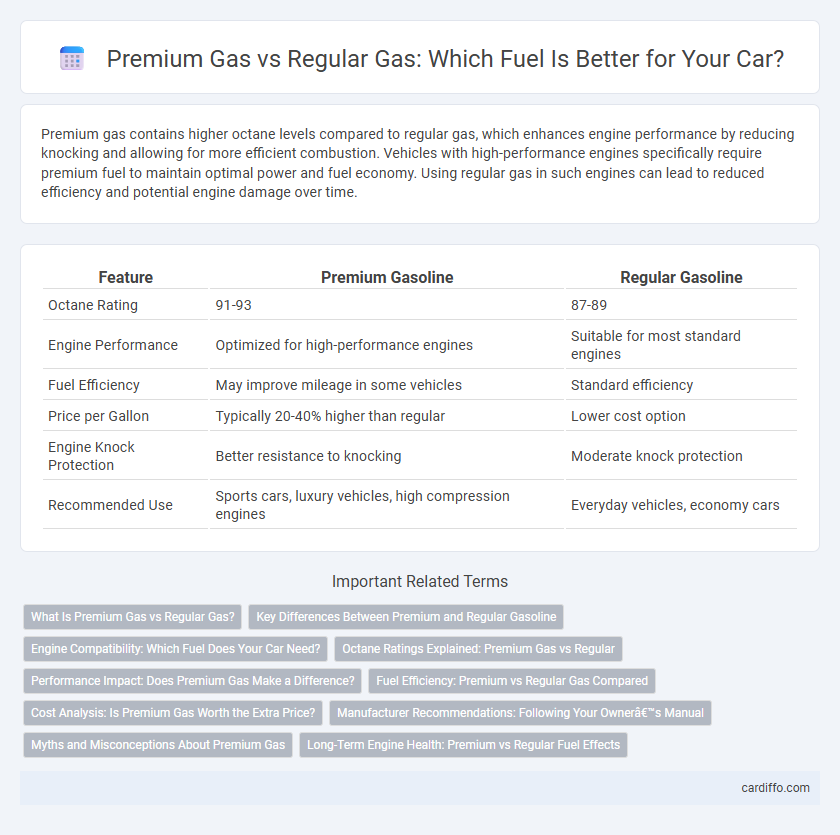Premium gas contains higher octane levels compared to regular gas, which enhances engine performance by reducing knocking and allowing for more efficient combustion. Vehicles with high-performance engines specifically require premium fuel to maintain optimal power and fuel economy. Using regular gas in such engines can lead to reduced efficiency and potential engine damage over time.
Table of Comparison
| Feature | Premium Gasoline | Regular Gasoline |
|---|---|---|
| Octane Rating | 91-93 | 87-89 |
| Engine Performance | Optimized for high-performance engines | Suitable for most standard engines |
| Fuel Efficiency | May improve mileage in some vehicles | Standard efficiency |
| Price per Gallon | Typically 20-40% higher than regular | Lower cost option |
| Engine Knock Protection | Better resistance to knocking | Moderate knock protection |
| Recommended Use | Sports cars, luxury vehicles, high compression engines | Everyday vehicles, economy cars |
What Is Premium Gas vs Regular Gas?
Premium gas contains a higher octane rating, typically 91-93, compared to regular gas, which usually has an octane rating of 87. The higher octane in premium gas prevents engine knocking in high-performance or turbocharged engines, ensuring better combustion efficiency. Regular gas is suitable for most standard vehicles without high compression engines, offering adequate performance and cost savings.
Key Differences Between Premium and Regular Gasoline
Premium gasoline contains a higher octane rating, typically 91-93, compared to regular gas which usually ranges from 87-89 octane, affecting engine performance and efficiency. Vehicles with high-compression engines or turbochargers often require premium gas to prevent knocking and optimize power output. Regular gasoline is suitable for most standard engines, offering cost savings without compromising everyday functionality but may lead to reduced efficiency in high-performance vehicles.
Engine Compatibility: Which Fuel Does Your Car Need?
The compatibility of premium gas versus regular gas depends primarily on your car's engine design and manufacturer recommendations. High-performance and turbocharged engines often require premium gas with a higher octane rating to prevent knocking and ensure optimal efficiency. Using the fuel type specified in your vehicle's owner manual enhances engine longevity and maintains fuel economy.
Octane Ratings Explained: Premium Gas vs Regular
Octane ratings measure a fuel's resistance to knocking and pre-ignition during combustion, with premium gas typically rated at 91-93 octane and regular gas at 87 octane. Higher octane fuel like premium gas is designed for high-performance or luxury vehicles that require greater engine compression, improving efficiency and preventing engine damage. Using regular gas in engines designed for premium may cause knocking, reduced performance, and possible long-term damage, emphasizing the importance of matching fuel octane to manufacturer specifications.
Performance Impact: Does Premium Gas Make a Difference?
Premium gas contains a higher octane rating, typically 91-93, compared to regular gas at 87 octane, which can improve engine performance in vehicles designed for high-compression engines. Using premium gas in these engines can enhance acceleration, reduce knocking, and optimize fuel efficiency, delivering a smoother driving experience. However, for most standard engines, regular gas provides comparable performance without significant benefits from premium fuel.
Fuel Efficiency: Premium vs Regular Gas Compared
Premium gas typically contains higher octane levels, which can improve engine performance and efficiency in vehicles designed for it, leading to better fuel combustion and reduced engine knocking. Regular gas, with lower octane, is sufficient for most engines and provides comparable fuel efficiency when used as recommended by the manufacturer. Using premium fuel in engines not requiring it often results in negligible improvements in fuel economy, making regular gas the more cost-effective choice for everyday driving.
Cost Analysis: Is Premium Gas Worth the Extra Price?
Premium gas typically costs 20-40 cents more per gallon than regular gas, but its higher octane rating mainly benefits high-performance or luxury vehicles designed for such fuel. For most standard engines, the improved combustion efficiency of premium gas does not translate into significant fuel economy or power gains, making the cost difference less justifiable. Analyzing long-term expenses, regular gas remains the economical choice for average drivers, with premium fuel offering minimal financial return unless specifically recommended by the vehicle manufacturer.
Manufacturer Recommendations: Following Your Owner’s Manual
Vehicle manufacturers provide specific fuel requirements in the owner's manual to optimize engine performance and longevity. Using premium gas in engines designed for regular fuel typically offers no added benefit and may lead to unnecessary expenses. Adhering strictly to the recommended octane rating ensures proper combustion, reduces engine knocking, and maintains warranty compliance.
Myths and Misconceptions About Premium Gas
Premium gas is often misunderstood as necessary for all vehicles, but it's actually designed for engines with high compression ratios or turbocharging that require higher octane to prevent knocking. Many drivers mistakenly believe premium gas improves fuel economy or engine performance in standard engines, yet studies show no significant benefits in cars designed for regular unleaded fuel. Misconceptions also include the idea that using premium gas regularly cleans the engine better, while most modern fuels contain detergents sufficient for routine maintenance regardless of octane level.
Long-Term Engine Health: Premium vs Regular Fuel Effects
Premium gas contains higher octane levels that prevent engine knocking and improve combustion efficiency, which can enhance long-term engine performance and longevity, especially in high-compression engines. Regular gas typically has lower octane, increasing the risk of knocking and carbon buildup that may degrade engine components over time. Choosing premium fuel for vehicles designed to require it helps maintain optimal engine health by reducing wear and preventing costly repairs.
premium gas vs regular gas Infographic

 cardiffo.com
cardiffo.com